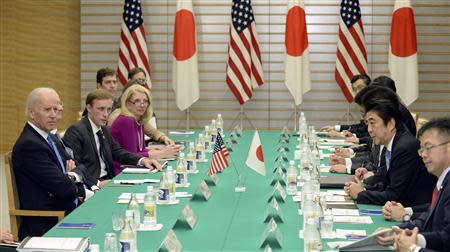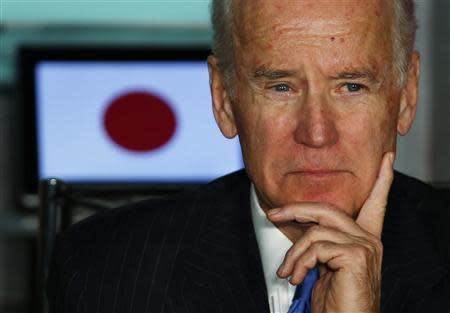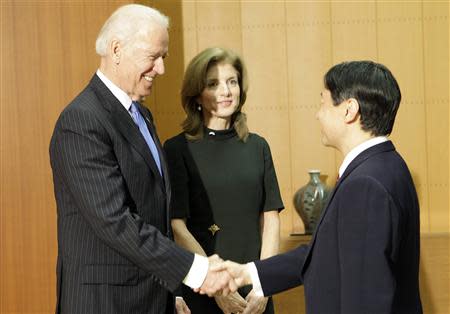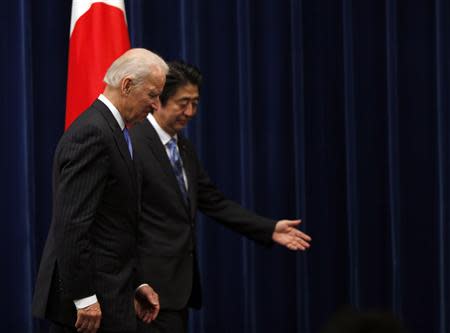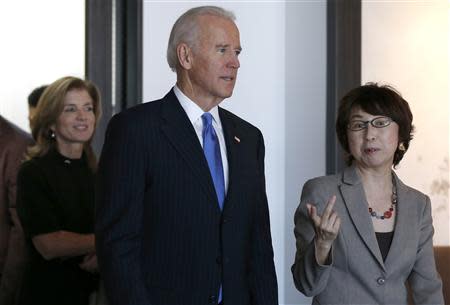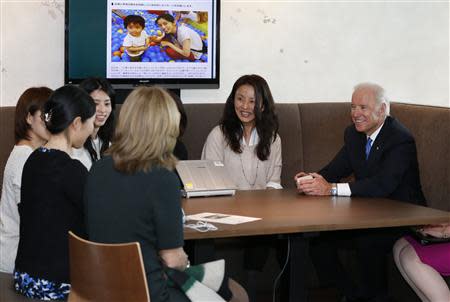Biden urges Japan, China to lower tensions over air defense zone
By Stanley White and Elaine Lies TOKYO (Reuters) - U.S. Vice President Joe Biden called on Japan and China to find ways to reduce tensions that spiked after Beijing proclaimed an air defense zone over disputed isles in the East China Sea, while repeating Washington was "deeply concerned" by the move. The United States has made clear it will stand by treaty obligations that require it to defend the Japanese-controlled islands, but it is also reluctant to get dragged into any military clash between the Asian rivals. "This action has raised regional tensions and increased the risk of accidents and miscalculation," Biden told a news conference alongside Japanese Prime Minister Shinzo Abe. "This underscores the need for crisis management mechanisms and effective channels of communication between China and Japan to reduce the risk of escalation." He said he would raise U.S. concerns directly when he met Chinese leaders. Biden was on the first leg of an Asian trip that takes him to Beijing on Wednesday and then to Seoul. Biden also called for better ties between Washington's Asian allies Tokyo and Seoul, chilled in recent months due in part to bitter South Korean memories of the 1910-1945 Japanese colonization of the Korean peninsula. Japan reiterated on Tuesday that Tokyo and Washington had both rejected Beijing's establishment of the zone - despite the fact that three U.S. airlines, acting on government advice, are notifying China of plans to transit the area. "We reaffirmed that policies and measures of both our countries, including the operations of the (Japanese) Self-Defense Forces and U.S. forces, will not change and we will closely cooperate," Abe told the news conference. "We agreed that we will not condone any actions that threaten the safety of civilian aircraft." Washington said over the weekend that the advice to U.S. airlines did not mean U.S. acceptance of the zone, and last week it sent two B-52 bombers into the area without informing China. U.S. COMMITTED TO "REBALANCING" TO ASIA Washington is also asking China not to set up an air defense zone in the South China Sea, where Beijing is locked in territorial rows with Southeast Asian nations, without first consulting countries concerned, a senior official travelling with Biden told reporters, according to Kyodo news agency. The Japanese and South Korean governments have advised their airlines not to submit flight plans in advance as demanded from all aircraft since it announced the creation of the zone on November 23. Japan Airlines and ANA Holdings, however, are uneasy about flying through the zone without notifying China's civil aviation authorities, two sources familiar with the Japanese carriers' thinking told Reuters. U.S., Japanese and South Korean military aircraft all breached the zone last week without informing Beijing and China later scrambled fighters into the area. Chinese Defense Ministry spokesman Geng Yansheng said China's request for flight plans was good for aviation safety. "A small number of countries' resolute refusal to report is not beneficial, and is an irresponsible display," Geng said in a statement on the ministry's website. "The East China Sea Air Defense Identification Zone is a safe, not risky zone, a zone of cooperation not confrontation." In an English-language commentary, China's official Xinhua news agency said Washington's desire to "shore up its little brother" (Japan) was somewhat understandable. But it added: "Yet when Tokyo keeps pissing off almost everybody in the region by its attitude toward its wartime history, it would ultimately cost the United States more than it would gain from backing a country that still honors those whose hands were red with American blood." Washington takes no position on the sovereignty of the disputed islands, known as the Senkaku in Japan and the Diaoyu in China. However, it recognizes Tokyo's administrative control and says the U.S.-Japan security pact applies to them. Biden also said Washington was "fully committed" to its strategy of "rebalancing" to Asia, dismissing doubts in Japan and elsewhere in the region over whether the United States has the resources to carry out that strategy given its fiscal woes, its attention on the Middle East, and partisan battles at home. (Additional reporting by Ben Blanchard and Michael Martina in BEIJING, Mark Felsenthal in WASHINGTON and Kiyoshi Takenaka in TOKYO. Writing by Linda Sieg. Editing by Dean Yates and Ron Popeski)


